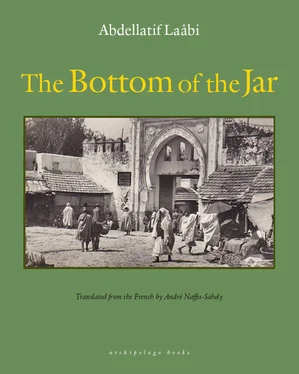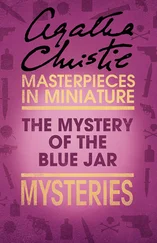“All these climbs and potholes are killing my knees!”
Following this first salvo came the day’s anecdote.
“This afternoon,” he began, “I headed toward Batha and walked up the Lion. The grand dame walking a few yards ahead of me was shamelessly ripping one fart after the other. She suddenly came to a stop, turned around, and nonchalantly asked, ‘Sidi, can you tell me if the evening prayer has been called?’ ‘It has, Lalla,’ I replied, ‘just when you farted for the third time.’ ”
Si Abdeltif continued in this lighter vein when it came to the interpretations of dreams. In the evenings, an adult would tell Si Abdeltif about his dreams in the most minute of details and with the utmost seriousness.
“I saw myself as clearly as I see you now, walking through a kitchen garden where all sorts of vegetables were growing. What struck me the most was that I was dressed in a red burnous whose hems were green. I racked my brains but couldn’t make sense of those mismatched colors. Let us pray to God that this isn’t a bad omen. So tell me, Si Abdeltif, what does this dream mean?”
Who, allowing the air of mystery to persist, replied, “It clearly represents a green-topped radish.”
“And?” the man insisted, intrigued.
“And it’s going to go straight up your ass!”
But Si Abdeltif was not particularly gifted when it came to the interpretation of dreams. In the company of children, however, he was careful to fill his stories with some educational content. When bringing an evening to a close, he would offer them riddles, like this one, which no one had ever deciphered.
“What is the name of the street in Fez where a camel can pass right under a minaret? Does anyone know? It’s clear you’re all blind. When you go through the arch that leads to Aïn Allou, lift your heads. What lies under that arch? The minaret of our mosque. The road I’m speaking of, you nincompoops, is our very own the Spring of Horses. Now scram. I’ve taught you enough for today.”
Si Abdeltif would then depart and the evening would carry on, even if less animatedly. The Touat people had stopped singing. There were few passersby in the street. Namouss’s gang was running low on ideas when they heard the sound of Chahmout’s voice coming from below Lalla Abla’s window. Of all that went on in the neighborhood, this ritual particularly intrigued the children. What was it all about? Chahmout was a distant cousin of Si Abdeltif’s. No one knew whether he was single or married. Lalla Abla, who was either a widow or a divorcée, was one of Namouss’s neighbors, and he knew her well. She was certainly good-looking and voluptuous. Were the stories behind these lovebirds known by the adults as well as the children, who were watching them at that late hour? The fact remains that Chahmout would stand beneath Lalla Abla’s window and, calling her by a man’s name, would bellow, “Abdeslam, oh Abdeslam!”
Lalla Abla would take a while to reply, and when she finally came to the window, would stand hidden behind the lace curtains and emit a barely audible coo.
Namouss, who was usually slow on the uptake about these things, finally wised up to what was going on. His heart racing wildly, he would hide under a nearby house’s vestibule so as not to bear witness to those illicit meetings verging on sin. He would wait until they had come to an end to leave his hiding place, at which point he would go elsewhere so he could clear his head.
He left his comrades behind, and breaking the promise he’d made to himself in the morning to go see Harrba perform that evening, he opted instead for the sanctuary of Moulay Idriss. Was it boredom or a crisis of faith? All bets are off.

LIFE RETURNED TO normal following the end of the holy month of Ramadan. The long evenings and nocturnal activities ceased. As darkness approached, everyone ate their dinner quickly and went to bed with the sun. Uncle Touissa disappeared once again. With him gone, it was difficult tvwo kill time in the evenings. The beginning of the school year was still some way off and Namouss was starting to find the days tediously long. In the clutches of idleness, he fell prey to a type of lethargy that took away his appetite and made him prone to solitude. The rooftop terrace became his favorite refuge. Lying in the sun weakened his mind and body even further, and when he persisted in staring fixedly at the star, he felt as if he was melting inside a boiling cauldron. He was then torn between allowing himself to dissolve and a vague instinct of self-preservation. While walking this fine line, the images of the incident at Small Springs came back to mind. He was biting down on the woman’s hand until he drew blood as he lay on top of her. The woman let him bite her without reacting, without letting out a cry. The noise around them became deafening. Then the white cloud enveloped them before seeping into his flesh and pouring a freezing liquid into his organs.
Namouss never mentioned the incident to his parents. Neither did he confide in his friends. Knowing words would fail him when it came to describing what had happened, he kept it a closely guarded secret.
The lethargy that invaded him would sometimes be accompanied by a sensation of another kind. A peculiar sort of energy flowed through his veins, provoking a tingling sensation across his skin, from the tip of his toes to his head. A new feeling, which he’d never known before, awakened in him. Before that summer, he had hardly ever paid attention to his body. At the hammam, he had no choice, of course. When his mother undressed him to change his clothes, he wanted it to be done as quickly as possible. When his friends decided to hold pissing contests to determine whose jet could spray the farthest, it had been difficult not to sneak a look at his cohorts’ willies and compare them. But then things took an altogether different turn. His rooted sense of propriety was being sapped by an intense curiosity in his own body. And he made a few pleasant discoveries. First came his hands, which he deemed gracious, then his feet, which he thought rather pretty. Then he felt his cheeks, lips, and gradually progressed to his chest and belly. Having reached the middle, he hesitated, even though that’s where the tingling he felt was strongest, and where there was an enticing stiffness that just waited for him to grab hold and give free rein to it, to pull it out into the open and let it bask in the rays of the sun so it might ripen to its full potential. His audacity went no further. What Namouss drew from the experience was the feeling of being pleasantly in tune with his body. This was how he came to take full possession of it and finally reside in it, having hitherto felt a little bit like a stranger in his own body. At this stage in his explorations, the idea of good and evil didn’t even cross his mind. What he felt was his alone, and he counted on keeping it free of foreign intrusions. Namouss already had his own secret garden.
The garden grew thanks to yet another curiosity. Judging by where he was, how could he not take an interest in what was happening on neighboring balconies? Namouss had been something of a poet from the very beginning. He loved looking out over the city whenever he climbed up to the rooftop terrace. From his promontory, he could see the minarets of all the important mosques. His gaze drifted first to the southern fort, then to the northern one, and then beyond to the olive trees clinging to the foothills along the horizon. Wholly absorbed, he watched the clouds of steam dancing slowly above the grid of houses, and lent his ears to the noises made by workshops and street-sellers. Crowning this scene, the sky offered him another perspective on visual digressions, a canvas that an inspired hand was painting ceaselessly using colors that Fez held the secret to and had given original names to: zebti (flesh color), qouqi (artichoke-mauve), fanidi (bubble gum), hammoussi (chickpea), zaâfrani (saffron), fakhiti (azure), zrireq (violet). Colors Ghita was enamored with. She would make bouquets of caftans with them and then lift them to the sky, painting the flock of scattered, woolen clouds in a multitude of hues. What could one say about the palette of colors produced by the sunsets when the Maghrib prayer was called — or about how the minarets lit up like paper lanterns? The horizon was then striated with wild arabesques that drew with their movements a panoply of turbaned heads, fire-breathing dragons, and winged houris — all aboard an immense flying carpet, whose fringes fanned out like a peacock’s tail.
Читать дальше













